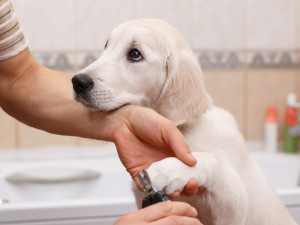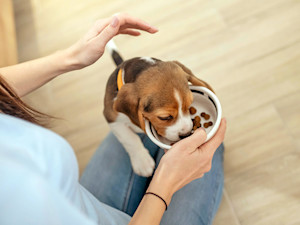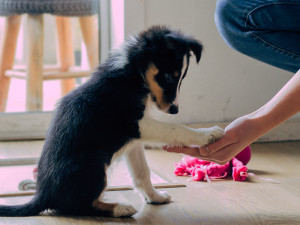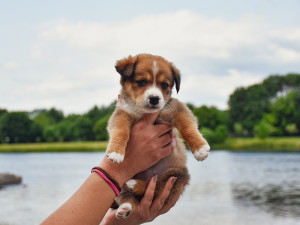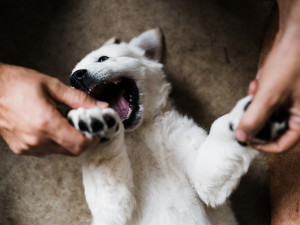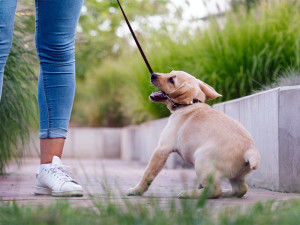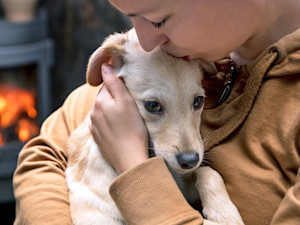Why Does My Puppy’s Breath Stink?
What happened to that adorable puppy breath? We explain everything.

Share Article
In This Article:
Understanding Puppy Breathopens in a new tab Common Causes of Bad Breath in Puppiesopens in a new tab How to Improve Your Puppy’s Breathopens in a new tab When You Should Visit the Vetopens in a new tab
Most new puppy parents like the smell of puppy breath. It’s sweet-smelling, primarily from the milk they consume. But as they age, you suddenly don’t enjoy your puppy’s mouth in your face so much. In fact, their breath becomes offensive.
You may wonder why it has changed and whether there’s something wrong with your pup. This guide will take you through the causes of bad breath in puppies — what’s normal and what’s not — how to make that breath smell better, and when it’s time for your dog to visit a vet.

littleKin™ is Kinship’s home just for puppy and kitten parents. Bop over to check out expert advice, new pet tools, and special deals—all curated for your newest family member.
opens in a new tabMain takeaways
Puppy breath smells sweet and pleasant due to their mother’s milk.
As your puppy starts to teeth, their mouth odor does not smell good.
There are many causes of bad breath in puppies.
There are ways to improve your puppy’s breath.
Sometimes, you may need to visit the vet about your puppy’s breath.
Understanding puppy breath
There are three main reasons you may like the smell of your young puppy’s breath.
Mother’s milk or milk replacer diet: This diet smells sweet, and combined with your puppy’s immature digestive system, their breath smells sweet, too.
Lack of bacteria: There are fewer bacteria in puppies’ mouths and GI tracts. This limited bacterial population adds to the sweet smell.
Good oral hygiene: Since puppies don’t yet have teeth with accumulated plaque, their mouths are cleaner.
As your puppy ages, these three things reverse. Bacteria multiply and diversify. Their teething begins. And the puppy no longer consumes their mother’s milk or milk replacer.
Common causes of bad breath in puppies
As puppies begin to eat dog food, begin teething, and acquire more bacteria in their system, their breath begins to change. You may no longer enjoy smelling their breath. In fact, it may start to smell badopens in a new tab. There are several possible causes for this.
Natural puppy breath
As mentioned, natural puppy breath in very young puppies can be pleasant to smell. Unfortunately, that’s temporary due to the change in their digestive system, bacteria in their mouths, and a change in diet.
Dental hygiene issues
As your puppy begins acquiring teeth, plaque can build from trapped food and bacteria in the mouth. If you’re not brushing their teeth, this can lead to bad breathopens in a new tab.
Dietary influences
Eating regular dog food, scavenging (through garbage, mulch, dirt, and other things found outside), or chewing on indoor items they shouldn’t chew on can lead to bad breath. Some puppies eat their own poop or even get into your cat’s litter box to eat the cat’s feces. These behaviors can certainly cause unpleasant breath.
Teething process
During the teething period, gums are inflamed, and that inflammation, along with an increased number of bacteria, can make a puppy’s breath stinky.
Health issues
Even though most puppies are healthy and their organs are functioning well, there are exceptions. Puppies can develop gastrointestinal issues, kidney or liver problems, or infections, which will change the odor in their mouths.
How to improve your puppy’s breath
Fortunately, there are easy treatments for most causes of bad breath in puppies.
Establish a dental care routine
It is a great time to introduce tooth brushingopens in a new tab while your puppy is young. You’ll need to do this for their entire life, and it’s easier to get them used to brushing at an early age. You’ll also get ahead of plaque and tartar buildup by starting early. Just be sure to use pet-safe toothbrushes and paste only. Do not use human toothpaste. It can be toxic to pets.
Choosing the right diet
Feed your puppy a high-quality, balanced diet to maintain not just oral health but also overall health. Be sure to feed puppy food, not adult food.
Offer safe chew toys
Dental chew toys can help decrease plaque, the precursor to tartar. An accumulation of tartar can lead to tooth loss, periodontal disease, and even internal organ issues. Also, water additives can decrease plaque and soften tartar.
Regular vet dental checkups
When your new pet is a puppy, you’ll need several visits to the vet to get puppy shots and boosters. Most vets look in your puppy’s mouth at every visit. If they don’t, ask them to. They can see things you probably wouldn’t, such as teeth not erupting at the right time, baby teeth not falling out when the adult ones come in, and anything else to be concerned about. Identifying issues early and resolving them will be easier and usually cheaper.
When you should visit the vet
There are times other than vaccine visits when a vet should check your pup. If your puppy suddenly has bad breath and it doesn’t go away, your vet should take a look. Also, such things as bleeding gums, vomiting, trouble chewing, or a loss of appetite warrant a vet visit.
FAQs
Is it normal for puppies to have bad breath?
That depends. It’s not normal for puppies to have consistently bad breath, especially during their early weeks when they typically have pleasant “puppy breath.” However, there are situations where bad breath in puppies may occur, and understanding the causes can help determine if it’s something to be concerned about. See “Causes of bad breath in puppies” above.
At what age do puppies lose puppy breath?
Puppy breath typically fades when they are around three to six months old, coinciding with teething. The process of growing adult teeth can lead to a change in bacteria in the mouth and may even cause minor gum bleeding or inflammation. Puppy parents often report a change from sweet breath to a metallic smell due to the blood.
Does puppy breath stink during teething?
Yes, that sweet puppy smell you came to love will change during teething. This may not stink, but it will have at least a slight odor, which will not be as pleasant as their young puppy breath. Teething usually occurs between three and six months of age, and involves changes that will cause unpleasant breath. These changes include bleeding gums, an increase in bacteria, chewing on dirty items, and even minor gum infections or inflammation.
References
LaRock, Amber. “Emergency Vets USA.” Emergency Vets USA, 8 July 2021, emergencyvetsusa.com/dogs-breath-smell-like-poopopens in a new tab. Accessed 24 Dec. 2024.
“Why Does My Dog’s Breath Smell? – RSPCA Knowledgebase.” rspca.org.au, 9 Nov. 2018, kb.rspca.org.au/knowledge-base/why-does-my-dogs-breath-smellopens in a new tab. Accessed 24 Dec. 2024.
“Why Does My Dog’s Breath Stink? Possible Reasons for Bad Breath.” American Kennel Club, www.akc.org/expert-advice/health/stinky-dog-breathopens in a new tab.
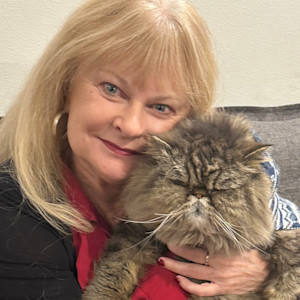
Dr. Shelby Neely, DVM
Dr. Shelby Neely is a freelance writer and veterinarian who graduated from The University of Pennsylvania and has practiced veterinary medicine for 30 years. She has found homes for hundreds of stray pets and has two cats as well as four grand-dogs and two grand-cats. In her spare time, Dr. Neely likes to be with her three children, their dogs and cats, and her own two cats. She also likes to see as many Broadway shows as possible.
Related articles
![Woman feeding puppy from a bowl at home.]() opens in a new tab
opens in a new tabPuppy-Feeding Schedule 101
They might act hungry all day, but it’s up to you to know the facts.
![Border Collie puppy shaking owner's hand]() opens in a new tab
opens in a new tabWhen to Start Training a Puppy: a Complete Puppy Training Schedule By Age
Your puppy training schedule, from eight weeks to six months. Let’s do this.
![Two hands holding a very young tan and white puppy up in front of a lake landscape]()
How to Socialize a Puppy
Everything you need to know to get your new addition off to a good start.
![Golden retriever puppy upside down playing with a mans hands and attempting to play bite.]() opens in a new tab
opens in a new tabHow to Train a Puppy Not to Bite
Those little razor teeth are no fun.
![Dog training at leash with a puppy.]() opens in a new tab
opens in a new tabHow to Calm a Puppy Down
Yes, it is possible.
![Woman snuggling her puppy in her arms.]() opens in a new tab
opens in a new tabPuppy Diarrhea: Possible Causes and What to Do About It
Diarrhea in puppies can be caused by many things.

